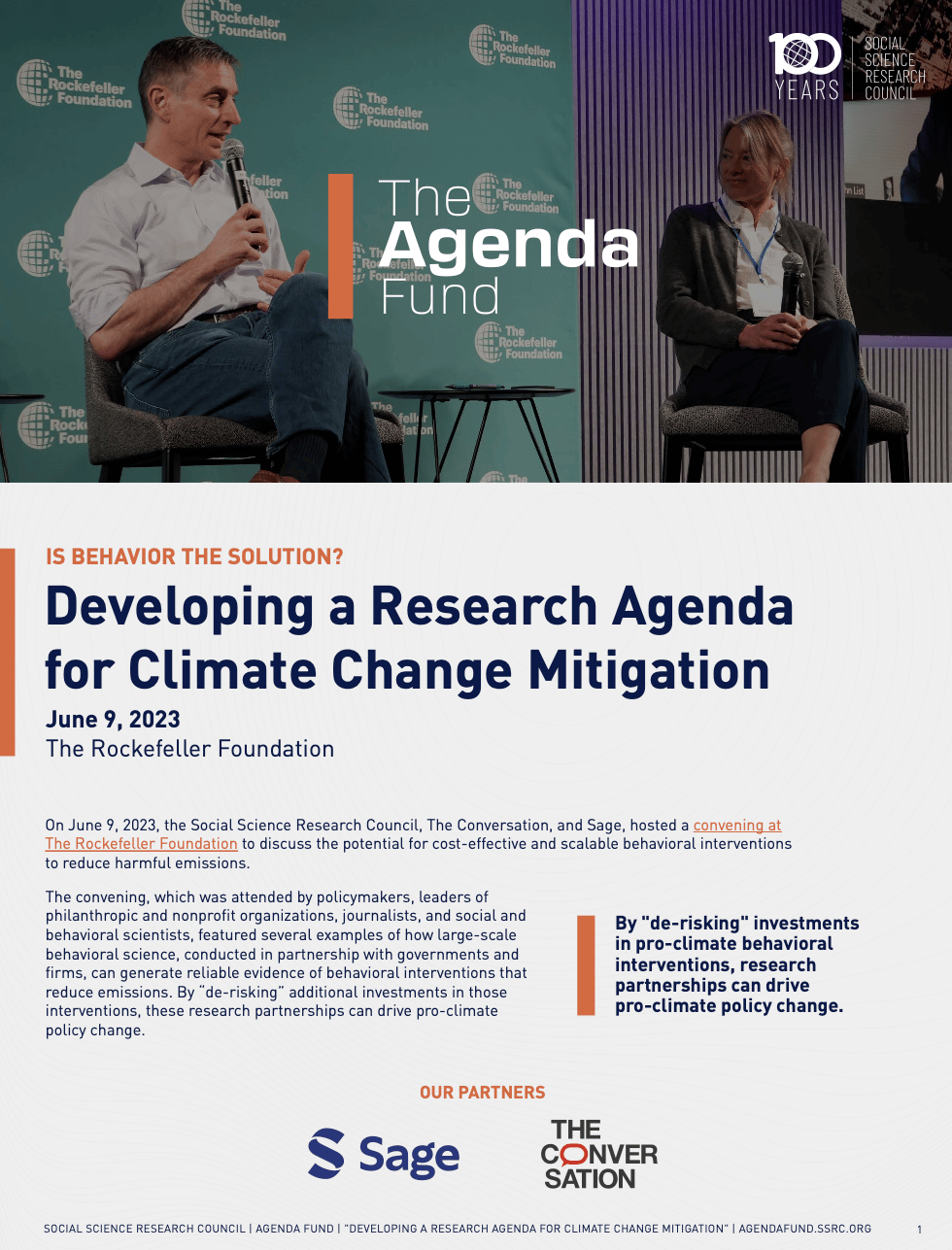
NOTE: The welcome reception which had been scheduled for Thursday, June 8 at The Rockefeller Foundation has been canceled, but Friday's event will go forward as planned. We look forward to welcoming you.
Recent investments in clean energy R&D have led to remarkable innovations in clean energy technology. These innovations hold the promise of slowing and perhaps even reversing decades of anthropogenic climate change.
But in order to fully realize the promise of clean energy innovation, we also need social innovation: social and behavioral science R&D aimed at finding the interventions, programs, and policies that can shift decision-making and behavior in the direction of reducing harmful emissions.
In 2022 the Intergovernmental Panel on Climate Change reported that “changes to lifestyles and behavior have the potential for large reductions in global greenhouse gas emissions.” Social and behavioral science R&D can help us find the interventions, programs, and policies that will lead to these climate-protecting changes in lifestyles and behavior.
In partnership with The Conversation and Sage, the Agenda Fund hosted this important conversation with leading social and behavioral scientists and climate thought leaders to discuss:
- what we know about cost-effective and scalable interventions to shift decision-making and behavior in the direction of reducing harmful emissions;
- the potential return on investment from expanding this knowledge base.
The event, “Is Behavior the Solution? Setting a Research Agenda for Climate Change Mitigation,” took place Friday, June 9, 2023, at The Rockefeller Foundation’s Global Headquarters in New York City. If you were unable to join us for the event, you can view all the panelists’ remarks in the Zoom recordings below.
We look forward to continuing this conversation with funders, policymakers, and the research community, and to sharing more takeaways about potential areas of research investment that offer real promise for climate change mitigation.
John A. List
University of
Chicago
Erica Myers
University of Calgary
Speakers
Karen Palmer
Resources for the Future
Casey Wichman
Georgia Institute of Technology
Climate Change Mitigation
Defining an Agenda for Social and Behavioral Science R&D
AGENDA FUND
June 9, 2023
The Rockefeller Foundation Global Headquarters
Catherine Wolfram
University of California, Berkeley
Elizabeth Yee
The Rockefeller Foundation
Overview
Overview
Research
Perceived Price in Residential Water Demand: Evidence From a Natural Experiment (2014)
Conservation Policies: Who Responds to Price and Who Responds to Prescription? (2016)
Information Provision and Consumer Behavior: A Natural Experiment in Billing Frequency (2017)
A Cautionary Tale on Using Panel Data Estimators to Measure Program Impacts (2017)
Smart Meters: Do Their Prices Matter to Their Adoption and Do They Save Energy? (2018)
Bicycle Infrastructure and Traffic Congestion: Evidence from DC's Capital Bikeshare (2018)
Do Energy Efficiency Investments Deliver? Evidence from the Weatherization Assistance Program (2018)
The Distributional Effects of Building Energy Codes (2019)
Are Home Buyers Inattentive? Evidence from Capitalization of Energy Costs (2019)
Social Comparison Nudges Without Monetary Incentives: Evidence From Home Energy Reports (2020)
Default Effects and Follow-On Behavior: Evidence From an Electricity Pricing Program (2021)
Decomposing the Wedge Between Projected and Realized Returns in Energy Efficiency Programs (2021)
Smart Thermostats, Automation, and Time-Varying Prices (2021)
Heterogeneous (Mis)perceptions of Energy Costs: Implications for Policy Design (2021)
Are Consumers Attentive to Local Energy Costs? Evidence From the Appliance Market (2021)
Mandatory Energy Efficiency Disclosure in Housing Markets (2022)
Do The Effects of Nudges Persist? Theory and Evidence from 38 Natural Field Experiments (2022)
Price-Responsive Allowance Supply in Emissions Markets (2022)
Water Affordability in the United States (2022)
Does Energy Star Certification Reduce Energy Use in Commercial Buildings? (2023)
Michael
Greenstone
University of Chicago
Andrew Hoffman
University of Michigan
Agenda
9:00 - 9:15 AM
Welcome
9:15 - 10:00 AM
Panel 1
President, Social Science Research Council
Executive Vice President, Programs, The Rockefeller Foundation
Senior Fellow, Resources for the Future
10:15 - 11:15 PM
Panel 2
Holcim (US) Professor of Sustainable Enterprise, University of Michigan
Associate Professor of Economics and Canada Research Chair in Environmental, Energy and Resource Economics, University of Calgary
Moderated by Camille Gamboa, Sage
Assistant Professor of Economics, Georgia Institute of Technology
11:15 - 12:30 AM
Panel 3
Milton Friedman Distinguished Service Professor in Economics,
University of Chicago
Kenneth C. Griffin Distinguished Service Professor of Economics,
University of Chicago
Moderated by Beth Daley, The Conversation
Moderated by Anna Harvey, Social Science Research Council
1:00 - 2:00 PM
Feedback Session





